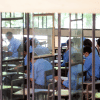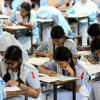All that’s wrong with the national school curriculum

One summer afternoon in class 9, our Physical Education teacher faced the biggest conundrum of his career as had to talk to some 17-year-olds about menstruation. Hesitantly, he talked about adolescence for 10 minutes.
Even if I dare call those uncomfortable minutes a National Curriculum and Textbook Board (NCTB) approved version of sex education, words such as periods, menstruation, or sanitary pads were completely prohibited. After finishing an entire chapter within minutes, he excitedly went on to teach us the measurements of a handball field, a sport none of us had the opportunity of trying out in real life.
If we excuse the inadequacies of his attempt at teaching us about sexual health without acknowledging any of the terminologies related to it, the incomplete nature of our sex education syllabus is just the tip of the sunken ship that is our high school curriculum.
Our curriculum also caters to our culture's fixation with choosing science over commerce or arts as students' preferred lane of education. Most schools make students with good grades pursue science and force students with poorer grades to choose the rest, regardless of their ambitions. Not only is this discriminatory towards students with low grades, an established culture of prioritising science has created a perception that only the most academically gifted can be allowed to pursue the subject. As a consequence, parents expect their children to choose science regardless of their children's interests.
"There is a false narrative that commerce is inherently easier than science, which is simply not true," says Anindya Alam, an undergraduate student at BUET. "Students with holistically poorer grades have to study subjects that might actually be much more difficult for them than science might've been."
A majority of educational institutions don't even have options for commerce or arts available until college. Once a student is forced to choose science in class 9 and stick to it until SSC exams, the shift from science to commerce in college becomes a difficult choice.
Meanwhile, the opposite – from commerce or arts to science – is practically impossible. The consequences are noticed in university entrance exams where a large number of students from science backgrounds migrate to commerce or arts majors every year. This substantiates the inefficiency of our current system.
Another crucial failure of our high school curriculum is its inadequacy to identify mental health issues and make students aware of it from a young age.

"Mental health is probably the most ignored topic in the whole academic life of a student," says Tasmin Khan, another student at BUET. "Some theoretical lessons are found in books but they're neither sufficient nor taught by people who're professionals in dealing with mental health. Students also aren't getting any counselling for learning to care for their emotions and master cognitive behaviour."
While our society fails to identify mental health as a part of our well-being, our high school curriculum introducing mental health issues in the course syllabus can help guide our kids into handling their emotions responsibly and in the process, start normalising mental health on a larger scale.
Ironically, the biggest shortcomings in our curriculum are evident in traditionally prioritised subjects like Physics, Chemistry, and Mathematics. Board approved books on Mathematics aren't application-oriented and focus heavily on solving problems. They lack explanations of mathematical theories which ought to develop the fundamentals, before approaching mathematical problems. The same goes for Chemistry and Physics as well.
"Board-approved Physics textbooks lack elaborate explanations and students need to take help of college-level books or tutors to understand the concepts," continues Anindya. "Chemistry, as a subject in Bangladesh, doesn't prioritise application-based studies at all. Most high school students despise Chemistry owing to its heavy reliance on memorisation."
Crucial chapters discussing industrial chemistry or laboratory safety end up being regarded hassles as students have to memorise irrelevant information for MCQs.
The curriculum relying less on theoretical study and more on mathematical problems has created a problematic culture among our students. Students can easily get away with exams by memorising how to solve particular types of mathematical problems that make frequent appearances in board exams.
The problem is apparent in subjects like Bangla and English as well. Though the NCTB approved Bangla textbooks are rich in content, the problem lies in their execution as the question pattern in exams is extraneous and inept. The MCQ portion, for instance, relies heavily on memorising specific information from stories or poems which doesn't fairly evaluate the examinee's comprehension of the text. English for Today, the board-approved English book is constantly made fun of owing to its bland choice of essays and poems, its futility in comprehending the linguistic capabilities of its readers, and its consequent failure in developing students' proficiency in English. The tests don't include aspects such as vocabulary or discourse analysis which are crucial factors in learning the language. The result is our students' subsequent anxiety, discomfort, and inefficiency regarding English.
Subjects like "Work and Life Oriented Education", "Career Education" and "Agricultural Studies" were intended to help develop a student's competence in the more practical side of affairs. However, in reality, students consider these subjects to be nothing but hassles compared to Science or Mathematics. Our culture of coaching classes has already contrived a way to capitalise on these courses included in the curriculum. The fact that high school students are considering taking tuition on a subject that's meant to prepare them for their careers depicts a dark portrayal of our collective understanding of education. It also portrays NCTB's shortcomings in devising the course content of these subjects.
NCTB plans to initiate a new curriculum by 2025 which will reportedly emphasise competence rather than theoretical knowledge and remove separate streams of education in classes 9-10. The Ministry has identified 10 such sectors of competence that they believe students should master by the time they pass the class 12. According to the proposed curriculum, students of classes 9 and 10 will get 50 percent of their marks in Bangla, English, Maths, Science and Social Science based on class performance, and the remaining 50 percent based on public exams. However, the remaining five subjects – Life and Livelihood, Religion, Physical and Mental Health, Arts and Culture, and Science and Technology will have their entire marks based on school performances.
This new curriculum might have detrimental repercussions according to multiple school teachers like Habib Ullah, senior teacher at Ideal School and College.
"With 5 of the 10 major subjects being graded entirely based on class performances, these subjects will lose their value as students will focus more on the remaining five subjects that'll be included in the public exams," Habib explains. "Consequently, these subjects might prove to be impractical owing to the grading system. Scopes of corruption might also be an issue if the grading's left in the hands of the schools."
The Ministry also plans to implement the same strategy in classes 11 and 12 where 30 percent will be based on class performance and 70 percent based on public exams.
The development of our national curriculum is an extensive and cumbersome process. The only silver lining is that NCTB is aware of the problems and intends to redefine our entire education system. With revised course contents, rewritten board books and new subjects prioritising students' skills and competence outside bookish theories, the success clearly depends on its proper execution. Unfortunately, when it comes to the precise execution of proposed ideas, NCTB doesn't have a decent track record.
Remind Ifti to be quieter at [email protected]

 For all latest news, follow The Daily Star's Google News channel.
For all latest news, follow The Daily Star's Google News channel. 









Comments